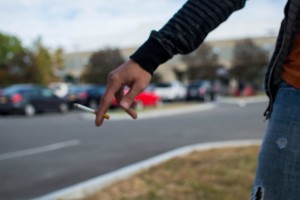Administration still working on enforcing tobacco-free policy

Staff Writer
Two years after the implementation of Hudson Valley’s tobacco-free campus policy, smokers can still be seen on college grounds.
According to a study of SUNY colleges conducted by the American Cancer Society, Hudson Valley has received an “A” grade due to its tobacco-free policy on campus. The code bans cigarettes and tobacco in all of its forms, including e-Cigarettes, chew and tobacco-flavored products.
Hudson Valley’s policy was created in response to a resolution passed in 2012 by SUNY administration expressing that all SUNY campuses should be tobacco-free by January 1, 2014. At the time, SUNY was pursuing legislation to require colleges be in compliance with the resolution, though no such laws have been passed yet. Since then, according to the 2015 NYS Dean’s List of Tobacco-Free Colleges, over 4 out of 10 New York colleges now prohibit smoking on campus.
In order to promote respect for others, improved health, sustainability, and social justice on campus, in 2013, Hudson Valley became one of the first SUNY campuses to completely ban tobacco. According to Dennis Kennedy, the director of communications and marketing, the decision to go completely tobacco-free was “viewed as a broader cultural change.”
Research shows smoking among both adults and high schoolers is in a steady decline. However, the 18-24 age group has seen no such change according to a presentation given by Judy Rightmyer, the Director of the Capital District Tobacco-Free Coalition. The Coalition worked closely with Hudson Valley as the campus was working out the details of its own tobacco-free guidelines.
Since the policy was implemented on August 26, 2013, the lack of a designated smoking area for students and faculty has raised some questions. During the original planning process, including such an area was considered, but administration felt as though it would be a step backward in its goals. “It kind of defeats part of what we were trying to do, which is basically educate on sustainability, educate on health and well-being and educate on social justice,” said Kennedy. “We don’t say you can’t smoke, we simply say you can’t smoke on campus.”
The use of vaporizers was also banned under the new policy. “As a part of our institutional, cultural change to go from permitting smoking and tobacco usage to prohibiting it, [vaporizers] were included within the broader policy,” Kennedy said. He also mentioned that though research is not conclusive, studies indicate that vaporizers, e-Cigarettes and similar devices may have negative effects comparable to traditional cigarettes.
Administration has been attempting to increase student awareness of the guidelines since the policy went into effect. Mailers are sent out with admissions materials to new students, tobacco-free was one of the messages on the Route 4 board, there are signs on every building and in the parking garage and the policy was a part of new student orientation this year.
But despite administration’s efforts, smoking and vaping still occur on campus. Though no repeat violators have been identified yet this year according to Director of Public Safety Frank Aliberti, warnings have been issued to students in several instances.
However, Kennedy has noticed an improvement: “I can tell you that having worked on the campus when smoking was allowed, and having worked on the campus after the prohibition of tobacco, there has been a wholesale change.”
